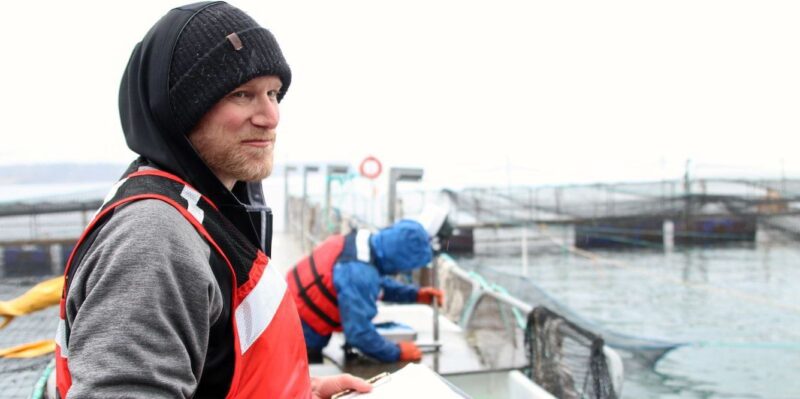Ocean farmers challenge dishonest diatribe of anti-aquaculture activists
“Aquaculture is the future, and if we do not allow it in Washington despite the best available science, it will nevertheless continue to grow everywhere else but here.”
By Fabian Dawson
SeaWestNews
Ocean farmers in Washington State are lashing out against anti-aquaculture activists saying they are “intellectually dishonest” in their campaigns to raise funds and challenge a government permit granted to grow fish in the waters of Puget Sound.
The five-year permit granted in January 2020, allows Canada-based Cooke Aquaculture to stock its Hope Island site with steelhead/rainbow trout, in partnership with the Jamestown S’Klallam Tribe.
Cooke got the permit to farm native fish, after Washington lawmakers voted to phase out and ban non-native finfish net-pen farming in the state following the 2017 collapse of a Cooke Atlantic salmon farm.
As part of the process, the Washington Department of Fish and Wildlife (WDFW) last week authorised the stocking at the Puget Sound sea site with approximately 365,000 native steelhead/rainbow trout, produced from eggs obtained from local brood stocks. The agency has previously alerted the public about the falsehoods spread by anti-fish farm activists in Washington.
The latest stocking permit has triggered off another round of “tired old unproven and outdated allegations that fish farms can degrade water quality, introduce disease to native fish populations and threaten imperilled animals like Southern Resident orcas,” said the Northwest Aquaculture Alliance (NWAA).
“Such inaccurate statements reveal just how out of touch your organizations have become regarding aquaculture as it is practiced today,’ said the NWAA, in an open letter to Wild Fish Conservancy, which is part of a group that is challenging the permits granted to Cooke.
The challenge will be heard by the Supreme Court of Washington next month.
“We applaud the WDFW for making this well-informed and science-based decision which, you ( Wild Fish Conservancy) failed to mention, was reached after a year of rigorous examination of the science as well as consultation with the scientific community, tribes, and the public,” said the NWAA.
“While campaigning against aquaculture has proven to be a sure-fire fundraising tactic, the fact is that the conversation about the farming of aquatic foods has changed over the past decade, and many past critics now recognize the incontrovertible fact that “water farming” has is now embraced as the most efficient, sustainable, responsible way to meet the protein needs of the growing world population.
“Perhaps the time has come for the groups within your consortium to avail yourselves of the most recent science and compelling evidence that exists today as to the real reasons behind the decline in native fish populations, rather than trotting out the same tired old unproven and outdated allegations,” said the organisation, whose mission is to promote a robust Blue Economy in Washington state and the region.
“For certain, aquaculture is the future, and if we do not allow it in Washington despite the best available science, it will nevertheless continue to grow everywhere else but here,” added the NWAA.
Last March, Dr. Rosamond Naylor, the William Wrigley Professor of Earth System Science at Stanford University’s School of Earth, Energy and Environmental Sciences, said “the movement to build productive and sustainable food systems has focused on transforming land-based crops and livestock, largely overlooking the critical role that fish and other aquatic foods play in nutrition, livelihoods and ecosystems around the world.”
In her science-based opinion, published in the journal, Nature, Dr. Naylor asserted that farming the seas “produces lower greenhouse gas emissions and environmental effects than industrial livestock.…The diversity of blue foods should be embraced as an opportunity, not an impediment, for improving food and nutrition security.”
Similar to the anti-marine aquaculture activism in Washington, their cohorts in neighbouring British Columbia also use outdated science and falsehoods in their fight against salmon farmers.
A recent poll showed that the falsehoods about salmon farming, precipitated by well-funded campaigns to destroy BC’s most valuable seafood export, has taken hold in the province. This poll also bolsters the science deficit decisions by Canada’s Fisheries Minister Bernadette Jordan to oust open-net salmon farmers from BC oceans in exchange for votes in the upcoming federal election.
Minister Jordan has consistently sidelined her staff and their scientific recommendations opting for “social licence and acceptability” to benefit the anti-fish farm lobby.
Last December, she announced the removal of salmon farms in the Discovery Islands’ which will see BC losing almost $390 million in annual economic output with $87 million less in annual salaries and benefits, and 1,535 fewer jobs, mainly in coastal communities of Vancouver Island. That decision flies in the face of nine-peer reviewed scientific studies that found farmed salmon pose minimal risks to migrating wild stocks in the Discovery Islands.
More recently, a new scientific study at the University of British Columbia has dismantled a key bogus claim by the anti-aquaculture activists, that the piscine reovirus (PRV) is a salmon killer and will devastate the iconic species in British Columbia.
The study, like the ones before, refutes core fearmongering by the activists who tell their followers that PRV allegedly spread from fish farms, cause diseases in wild salmon stocks.
But these peer-reviewed scientific findings are never referred to or dismissed as industry-funded in the social media campaigns by the anti-marine aquaculture activist groups.
(Image shows a worker at Cooke Aquaculture’s Hope Island salmon farming site in Washington State. Photo: Cooke)

